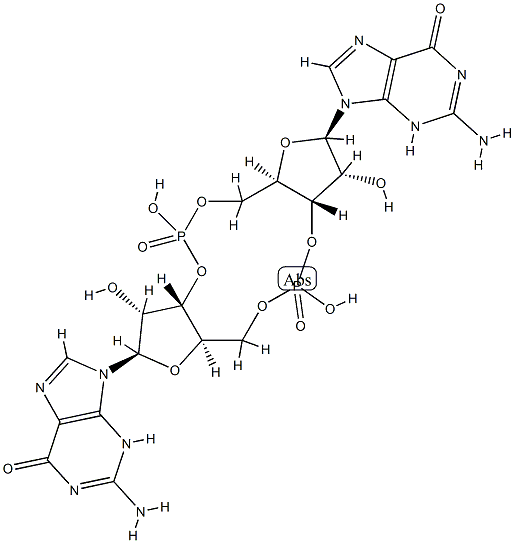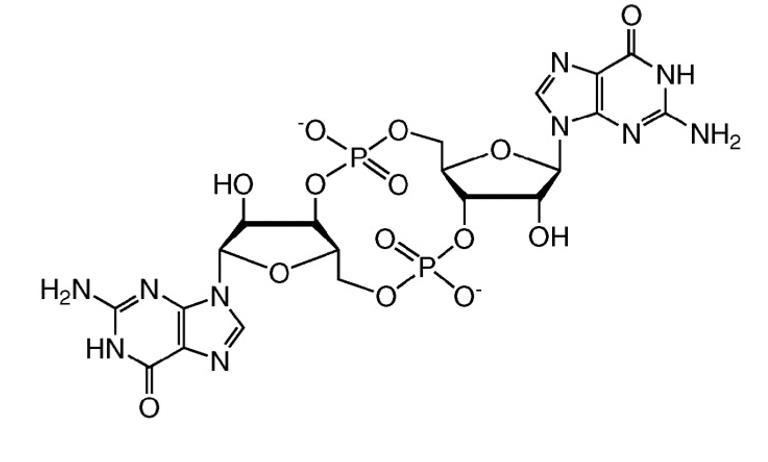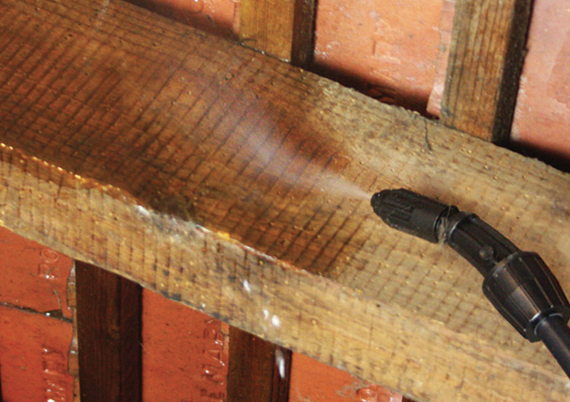Bis(3',5')-cyclic diguanylic Acid: Physiological Activities, Synthesis and Degradation
General Description
Bis(3',5')-cyclic diguanylic acid functions as a crucial secondary messenger in bacteria and some eukaryotes, regulating biofilm formation, motility, and virulence. It acts as a molecular switch, promoting biofilm formation and inhibiting motility. Its levels impact bacterial virulence, with high levels reducing virulence and favoring biofilm formation. In eukaryotes, Bis(3',5')-cyclic diguanylic acid influences physiological processes like root development in plants and morphogenesis in fungi. Synthesized by diguanylate cyclases and degraded by phosphodiesterases, the balance of Bis(3',5')-cyclic diguanylic acid levels is vital for bacterial adaptation and survival in changing environments, offering potential targets for antimicrobial strategies.
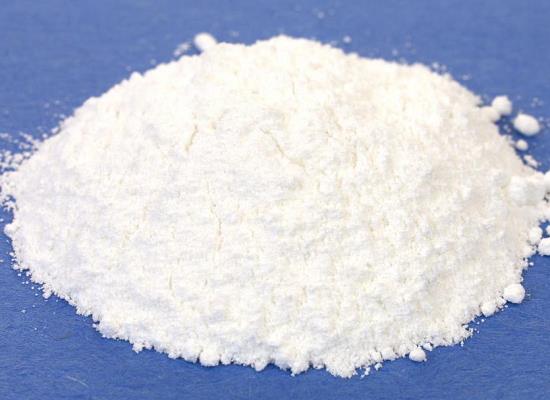
Figure 1. Bis(3',5')-cyclic diguanylic acid
Physiological Activities
Bis(3',5')-cyclic diguanylic acid is a small molecule that plays a crucial role in regulating various cellular processes in both prokaryotes and some eukaryotes. It functions as a second messenger, transmitting signals within cells to control important physiological activities. One of the primary physiological effects of Bis(3',5')-cyclic diguanylic acid is its role in regulating bacterial biofilm formation. Biofilms are communities of bacteria that adhere to surfaces and form a protective matrix. They play significant roles in various environmental and clinical settings, including chronic infections. C-di-GMP acts as a molecular switch, promoting biofilm formation by stimulating the production of extracellular polysaccharides and adhesion factors while repressing motility and dispersal of individual bacteria. Additionally, Bis(3',5')-cyclic diguanylic acid is involved in controlling bacterial motility. It regulates the transition between motile and sessile states, affecting processes like flagella synthesis, chemotaxis, and swarming behavior. High levels of c-di-GMP generally promote a sessile lifestyle, while low levels favor motility. Furthermore, Bis(3',5')-cyclic diguanylic acid has been found to impact bacterial virulence. In many pathogens, high levels of c-di-GMP are associated with reduced virulence, as it favors biofilm formation and inhibits the expression of virulence factors. Conversely, low levels of c-di-GMP enhance virulence by promoting motility and the expression of factors necessary for host invasion and immune evasion. In some eukaryotes, such as plants and fungi, Bis(3',5')-cyclic diguanylic acid is also involved in important physiological processes. For example, in plants, it affects root development, stomatal movement, and responses to stress. In fungi, Bis(3',5')-cyclic diguanylic acid influences processes like morphogenesis, hyphal growth, and biofilm formation. In summary, Bis(3',5')-cyclic diguanylic acid serves as a versatile signaling molecule, regulating biofilm formation, bacterial motility, and virulence in bacteria, as well as playing essential roles in various physiological processes in eukaryotes. Its ability to modulate these diverse functions highlights its importance as a key regulator of cellular activities across different organisms. 1
Synthesis and Degradation
Bis(3',5')-cyclic diguanylic acid is a crucial secondary messenger molecule in bacteria, involved in regulating various cellular processes like biofilm formation, motility, and virulence. Its synthesis is catalyzed by diguanylate cyclase (DGC) enzymes, which condense two GTP molecules to form c-di-GMP. Environmental cues can modulate DGC activity, controlling c-di-GMP levels. Conversely, phosphodiesterases (PDEs) degrade c-di-GMP by hydrolyzing its phosphodiester bond. PDEs containing EAL or HD-GYP domains generate pGpG or GMP molecules. Both synthesis and degradation of Bis(3',5')-cyclic diguanylic acid are responsive to environmental stimuli. The fine balance between c-di-GMP synthesis and degradation plays a pivotal role in bacterial behaviors. Higher c-di-GMP levels promote biofilm formation by stimulating extracellular polymeric substance (EPS) production, facilitating surface adhesion and community formation. Conversely, lower c-di-GMP levels favor bacterial motility and dispersion, aiding colonization of new environments. This dynamic regulation of Bis(3',5')-cyclic diguanylic acid enables bacteria to adapt and survive in diverse niches. Understanding the mechanisms underlying Bis(3',5')-cyclic diguanylic acid synthesis and degradation is crucial for comprehending bacterial physiology and developing strategies to control bacterial behaviors. Manipulating Bis(3',5')-cyclic diguanylic acid levels could potentially modulate biofilm formation, virulence, and other cellular processes. Consequently, research into Bis(3',5')-cyclic diguanylic acid regulation has important implications for combating bacterial infections and designing novel antimicrobial approaches. In conclusion, Bis(3',5')-cyclic diguanylic acid is a key secondary messenger in bacteria, with its synthesis and degradation tightly regulated to maintain cellular homeostasis and respond to changing environmental conditions. The balance between these processes influences bacterial behaviors such as biofilm formation and motility. Studying Bis(3',5')-cyclic diguanylic acid regulation is essential for understanding bacterial physiology and developing strategies to control bacterial behaviors and combat infections. 2
Reference
1. Wang T, Hua C, Deng X. c-di-GMP signaling in Pseudomonas syringae complex. Microbiol Res. 2023; 275: 127445.
2. Kreiling V, Thormann KM. Polarity of c-di-GMP synthesis and degradation. Microlife. 2023; 4: uqad014.
You may like
Related articles And Qustion
See also
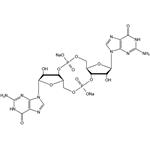
US $0.00-0.00/kg2025-04-21
- CAS:
- 61093-23-0
- Min. Order:
- 1kg
- Purity:
- ≥95.0%
- Supply Ability:
- 1000 kg
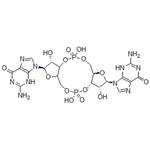
US $0.00-0.00/g2025-04-20
- CAS:
- 61093-23-0
- Min. Order:
- 10g
- Purity:
- 99% HPLC
- Supply Ability:
- 10000
